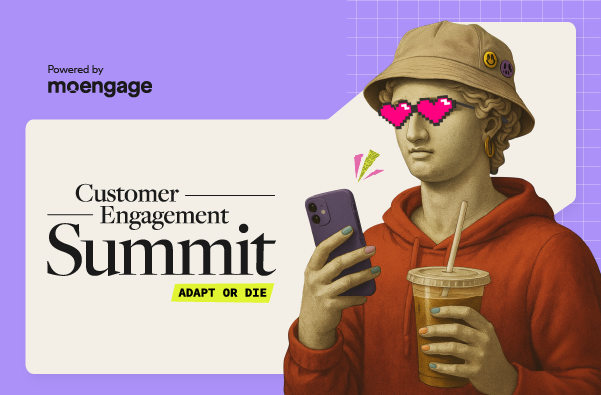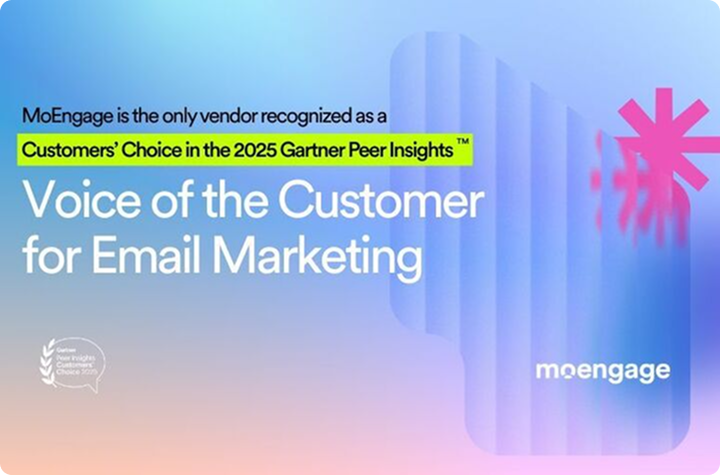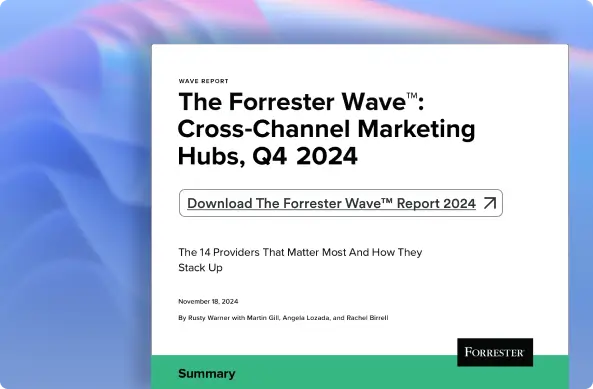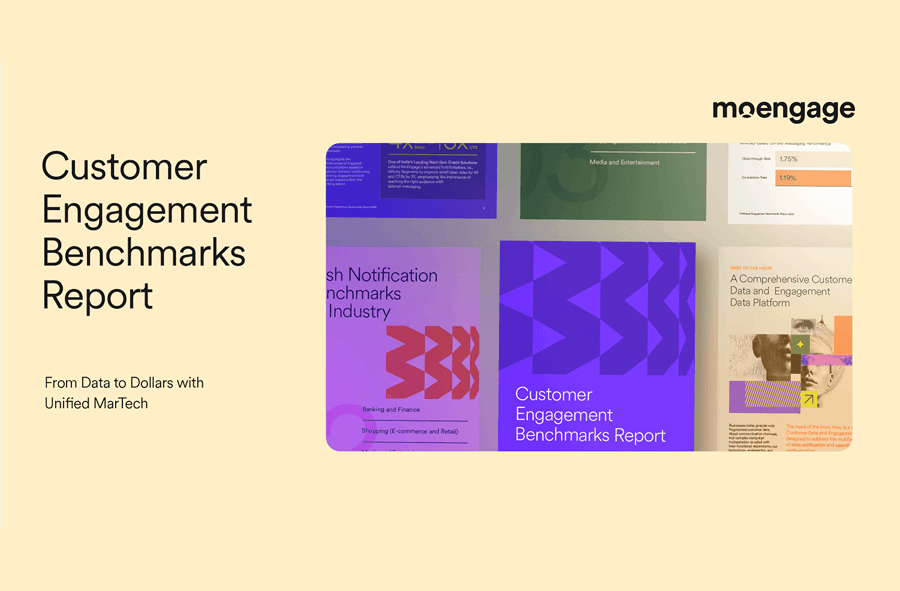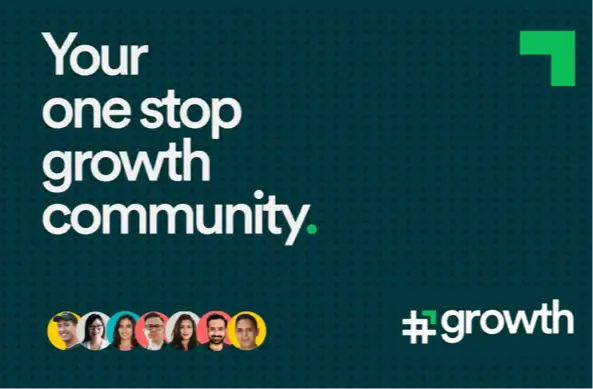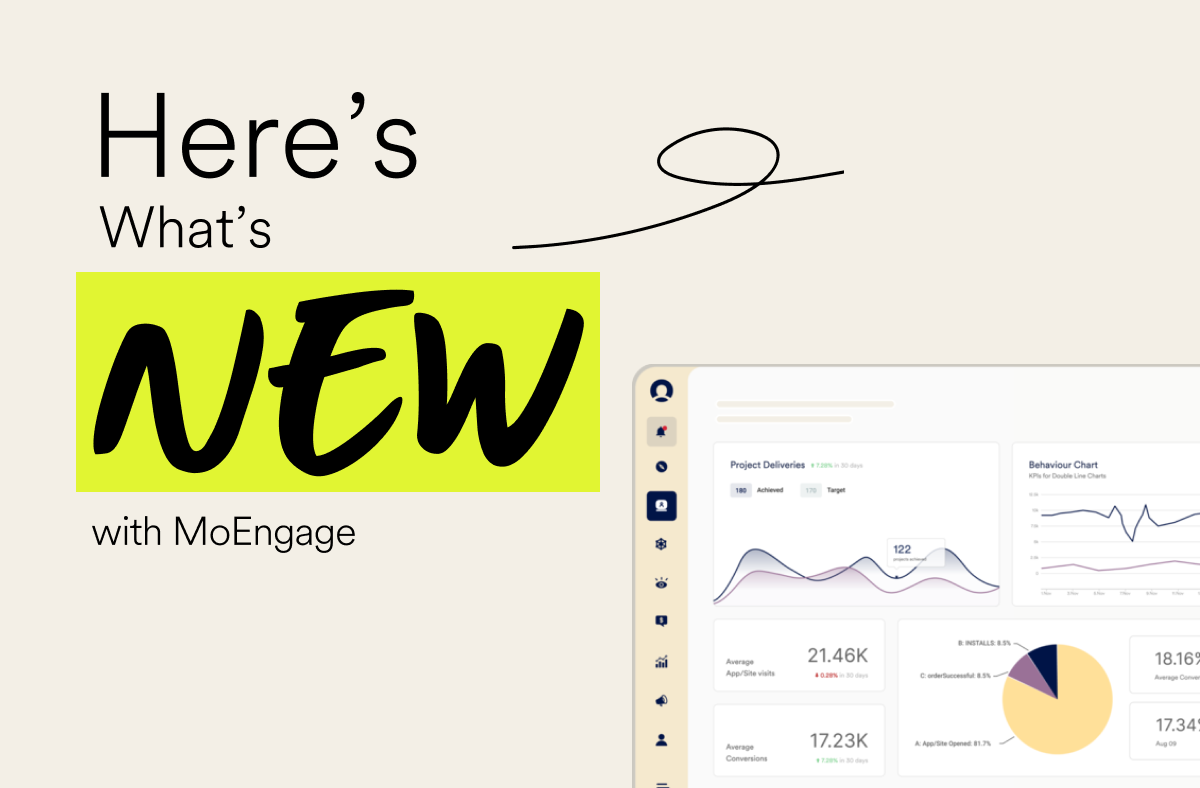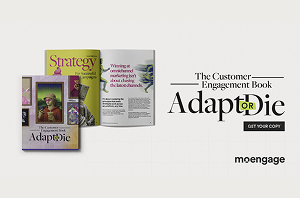5 Best Email Personalization Tools for B2C Marketers
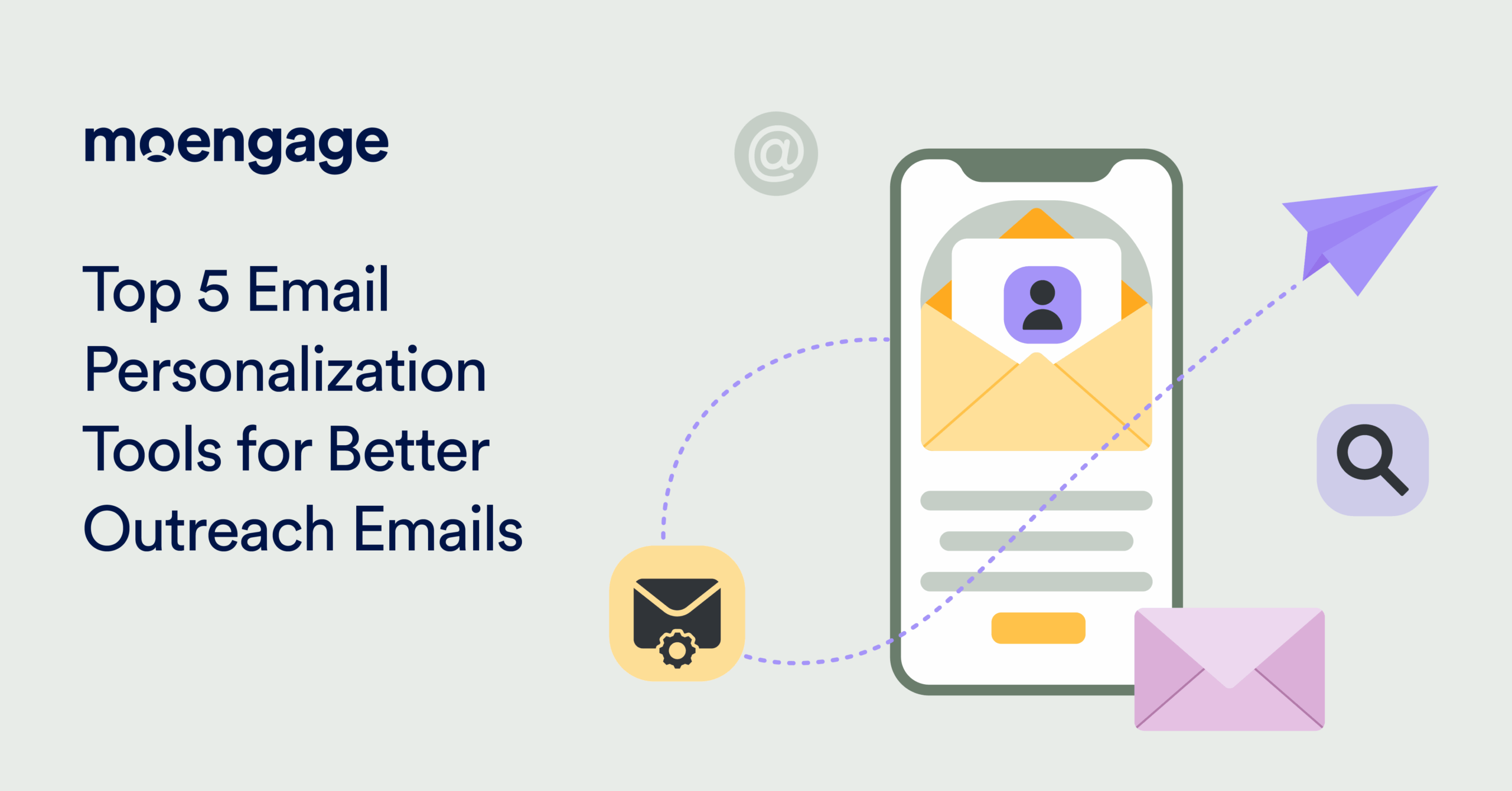
Let’s face it, we’ve all been there: sending out generic emails, hoping someone will click or reply… But that doesn’t have to be the case anymore. With the help of email personalization tools, B2C marketers can now create campaigns that not only get opened but are genuinely engaging and enjoyable for the recipients.
The stats don’t lie, either. According to Statista, 62% of consumers would shift away from a brand if it didn’t personalize their customer experience. Even better, a survey found that 95% of senior marketers believed their personalization strategies had paid off. Numbers like these prove just one point: the email personalization revolution is in full swing.
Leading that revolution, personalized email marketing software solutions make the hard stuff look easy: segmenting audiences, automating campaigns, and delivering emails that make customers feel like they do have fairy godmothers, after all.
Now, what kind of personalization tool does your brand actually need? Which features matter? More importantly, how do you wade through all the options without pulling your hair out?
Glad you asked. Because these are the exact questions this blog post aims to answer.
Let’s dig in without further ado.
5 Types of Email Personalization Tools
First, you should understand the different types of email personalization tools and what they’re actually built for. Let’s look at the five main tool types, so you can choose the one that best suits your audience, goals, and sanity.
- Basic Demographic Personalization Tools: These are straightforward tools designed to slap a first name, location, or other basic demographic data into emails. They’re designed to cover the basics, like inserting a customer’s first name into an email, referencing their location, or acknowledging their birthday.
- Behavioral Trigger Tools: These tools are great for sending emails that react to customer actions (or inaction) to drive engagement, such as abandoned cart reminders or post-purchase follow-ups.
- Dynamic Content Tools: When you want to deliver personalized content to each audience segment, all within the same B2C email marketing campaign, dynamic content tools are your go-to. For example, need to send an email that shows Bike A to cycling enthusiasts, Bike B to mountain bikers, and Bike C to casual riders, all without creating separate campaigns? Done.
- AI Email Personalization Tools: AI-powered tools take personalized communication to the next level. Whether it’s personalizing product recommendations, predicting the best time to send emails, or even crafting subject lines, these email personalization tools use customer data to maximize engagement with minimal guesswork. For big companies managing vast audiences and tons of data, it’s worth the investment.
- Full-Service Email Marketing Automation Suites: Finally, if you don’t just want personalization, but an integrated system that combines segmentation, behavioral triggers, campaign management, and CRM features in one cohesive platform, then full-service email marketing automation platforms are the way to go. They handle everything, from automated workflows to behavior-driven messaging, making them ideal for enterprise teams juggling high-touch campaigns and complex customer journeys.
For smaller brands, starting simple with demographic personalization or behavioral trigger tools might be the smartest move. Meanwhile, marketing teams with complex needs might benefit from AI email personalization tools or full-service platforms. No matter which tool type you use to personalize email content, understanding this breakdown will bring you one step closer to finding the perfect match.
How to Choose an Email Personalization Software
Let us tell you a fun little secret about the perfect tool: it doesn’t exist. Every brand is different, and your email personalization software needs to flex with your unique needs for your email marketing strategy.
Here are 5 things you should consider when choosing an email personalization tool.
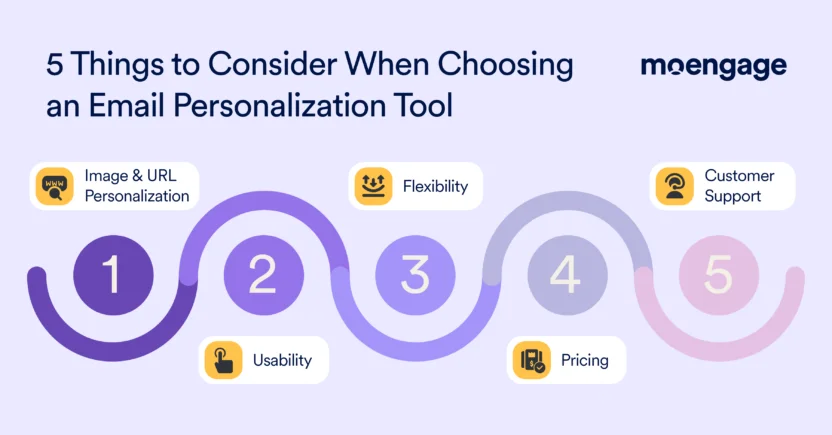
- Image and URL Personalization: Great email personalization doesn’t just stop at “Hi, [First Name]” anymore. So, before you hit “subscribe” on a software plan, ask yourself: can you customize images, like showing a product someone’s already viewed? Can you generate dynamic URLs that reflect user-specific parameters (e.g., links that take Sarah directly to Sarah’s cart, and not just some generic homepage)?
- Usability: Nobody wants to spend 3 weeks deciphering complicated tools. Check whether the personalized email software is intuitive enough for your team to jump in without begging IT for hand-holding tutorials. Better yet, does it allow automation, or will you have to fiddle with the backend every other Wednesday just to keep your email marketing campaigns running?
- Flexibility: Before committing to an email marketing automation software platform, ensure that it integrates with the tools you already use (like CRMs). Can it scale as your customer base grows, or will it start doing the Baby Shark dance the moment your subscriber list hits five digits?
- Pricing: While it’s tempting to grab whatever’s cheapest, make sure you’re getting good value for what you’re paying. Does the “basic” plan include all the features you actually need? Will the cost skyrocket if you grow your email list by a few thousand extra contacts? It’s no good buying a tool you can’t afford 6 months down the line.
- Customer Support: Finally, when things go sideways (and they will go sideways), you’ll need someone who can swoop in and save the day. So, does the email personalization platform offer responsive, real human support that holds your hand till the issue is resolved?
Again, when considering different personalized email software solutions, keep your goals top of mind, and don’t be afraid to test-drive a few options. The right tool is one that makes your marketing team’s lives easier.
But how?
3 Benefits of Using Personalized Email Marketing Software
Beyond just sticking a name in a subject line, email personalization tools take audience segmentation, behavioral insights, and automation, and transform them into the kinds of emails that make customers go, “Hey, they got me!”
But why exactly is using personalized email marketing software such a big deal? Here are three benefits of following a more tailored approach toward your customer relationship emails.
1. Optimized Email Performance
From open rates to click-through rates to conversions, email personalization tools focus on driving email marketing metrics that matter. For example, if your average email open rate is lower than 15%, you’ll know the subject line needs to be changed.
In this way, you can keep optimizing your emails based on the metrics your tool analyzes. The result? Sooner than you knew, you’re crafting re-engagement emails that your audience loves!
2. Better Customer Experience
Customers want to feel seen, heard, and valued. Personalized email campaigns create a better customer experience by making recipients feel like the emails were written just for them. Even more so, when you know the best time to send an email to them.
It’s about making the connection. Humans thrive on connection. Whether it’s offering a personalized discount for someone’s birthday or sending a reminder about the cart they abandoned last Tuesday (hey, we’ve all done it), these email marketing software solutions help you build real rapport.
And when the experience is better, so is the customer loyalty, and in turn, the customer Lifetime Value (LTV).
3. Higher Customer Retention
Using email personalization tools helps you keep your customers coming back for more.
Customer retention thrives on relationships, and relationships thrive on trust. That’s what personalized emails build. By delivering value-driven, relevant content that aligns with customer needs and expectations, you’re keeping them engaged long after the first sale.
Loyal customers are undoubtedly the Grand Slam of marketing (repeat purchases, brand advocacy, etc.), and personalized marketing software solutions make it easier to cultivate that loyalty. At the end of the day, customers stick with the brands that make them feel understood.
5 Best Personalized Email Marketing Software for Increasing Customer Engagement
Somebody somewhere is still sending “Dear [Customer Name]” snooze-fests. Please don’t tell us you’re among them (#justkidding). Because there are so many email personalization tools to give your generic email blasts their much-needed makeover!
Below, we’ve rounded up five of the best tools, each with its unique strengths, pricing structure, and ideal use case.
1. MoEngage
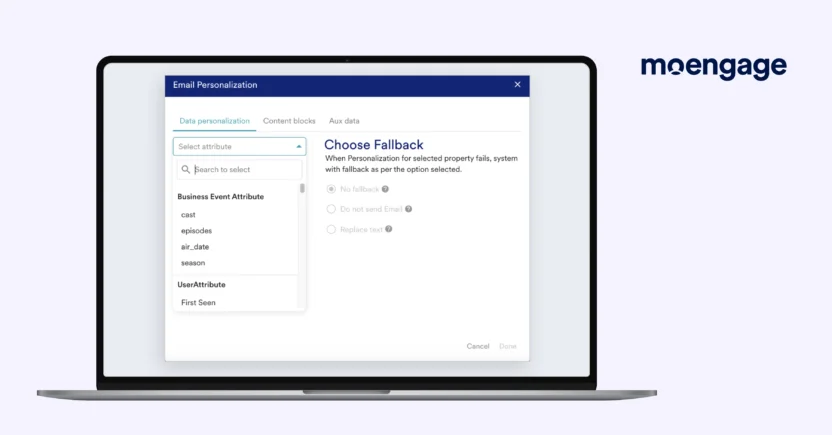
MoEngage is a full-service email marketing automation platform designed to help brands deliver personalized email campaigns at scale.
What sets it apart as an email personalization platform is its robust AI-driven insights, which allow B2C marketers to predict customer behavior and deliver perfectly-timed messages across multiple channels, not just email.
How pricing works: There are basically two pricing plans: Growth and Enterprise. Pricing starts at $750 per month and scales based on business size and the number of users.
Key features: MoEngage offers everything, from dynamic content personalization and AI-based recommendations to advanced Recency, Frequency, and Monetary Value (RFM) segmentation capabilities. Its predictive analytics feature is especially useful for optimizing email send times, understanding customer behavior patterns, and ensuring email marketing campaigns resonate with audiences. The platform also helps you personalize images and URLs in your emails to drive conversions.
Best for: Mid-to-large-scale brands, especially in Ecommerce, B2C SaaS, or fintech, that need to engage massive customer bases across multiple channels, while ensuring personalization remains seamless and relevant to each customer.
2. Warmer.ai
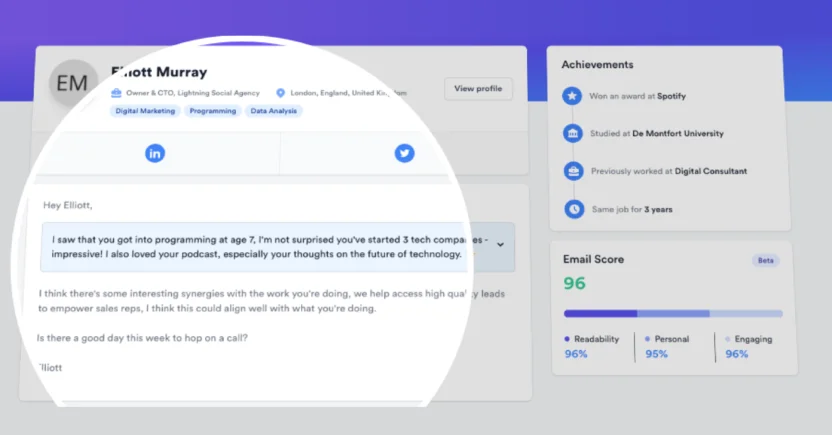
Warmer.ai is an AI email personalization tool that can craft unique, human-like emails in seconds. The emails are based on research about your recipient from their website and LinkedIn profiles, helping you stand out in crowded inboxes.
How pricing works: Pricing starts around $59 per month, with pay-as-you-go credits depending on the number of emails you need.
Key features: This email personalization platform uses AI to generate personalized first lines, tailoring each email’s introduction based on the prospect’s LinkedIn profile, company websites, or social media presence.
Best for: Freelancers and small brands trying to improve cold email outreach and build better connections with potential clients or collaborators.
3. Smartlead
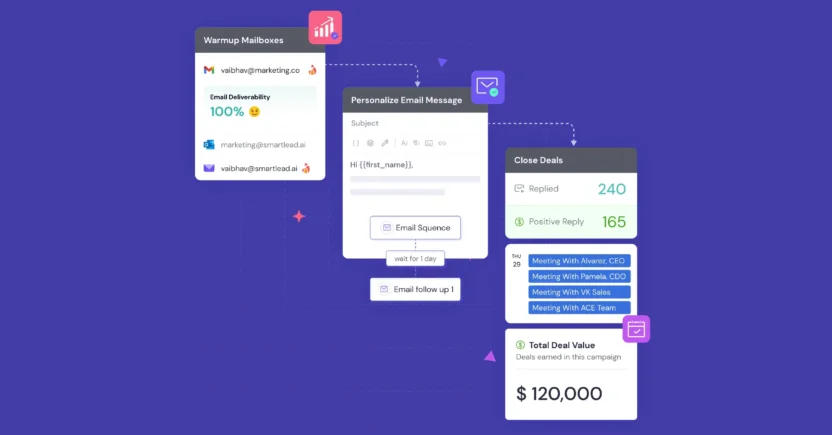
Smartlead is one of the most versatile email personalization tools designed for scale. It helps brands send hyper-personalized emails in bulk, while avoiding spam folders. Despite being technically sophisticated, it feels accessible even for non-technical users.
How pricing works: Plans start at $39 per month for sending 6K emails, with its Custom Plan starting at $174 per month for more than 150K emails.
Key features: Smartlead comes with features like automated follow-ups, A/B testing, and advanced deliverability tools to ensure your emails land where they’re supposed to (inbox, not spam). It supports multi-account email campaigns, allowing you to scale your outreach without running into inbox limitations. Integrations with CRMs and drip sequences take its personalization capabilities to the next level.
Best for: Brands, particularly small and medium-sized ones, that need advanced email personalization without spending a fortune.
4. Lyne
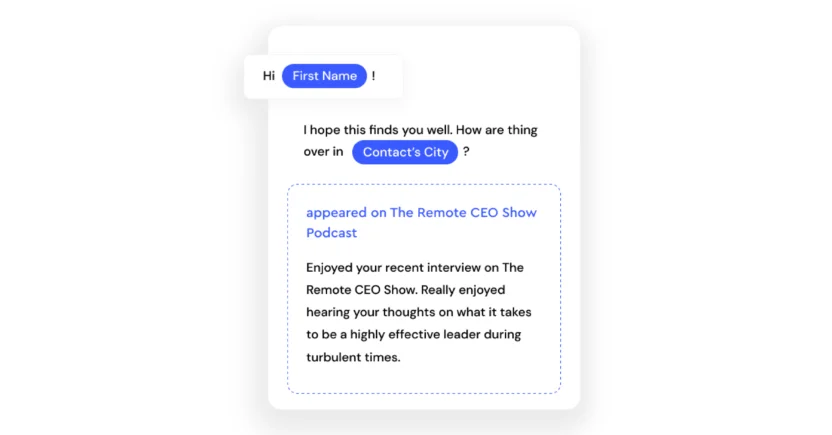
Lyne is another fantastic email personalization platform geared toward cold outreach, but it takes things even further with its hyper-intelligent AI. Its primary focus is crafting personalized email intros quickly and at scale.
How pricing works: Lyne operates on a pay-as-you-go model with its Free plan. Under its Custom plan, it charges around $120 a month for sending 2K emails.
Key features: Lyne’s AI can research up to 12 different personalization points, including prospects’ LinkedIn profiles, company details, and even recent press mentions to generate high-quality email intros. It also supports bulk outreach, so you can craft hundreds of personalized intros in minutes without sacrificing quality. The simple interface makes it easy to use, and its insights help make marketing emails feel less robotic.
Best for: B2C marketers who rely on cold emails to generate leads and want to maintain a human touch without investing hours in research.
5. Mailjet
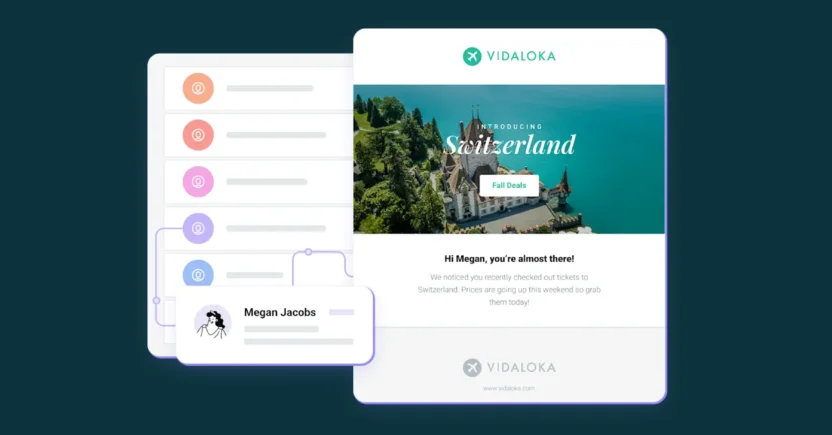
Mailjet is a robust email marketing platform that combines advanced personalization features with team collaboration tools. Designed for flexibility, Mailjet allows marketers, designers, and developers to collaborate seamlessly on email campaigns.
How pricing works: The Essential plan starts at $17 per month for 15K emails, with advanced features available in higher-tier plans.
Key features: Mailjet offers segmentation, dynamic content personalization, and detailed performance analytics to optimize campaigns. The standout feature is its real-time collaborative email builder (similar to Google Docs for email), which allows multiple users to work on an email simultaneously. It also integrates easily with APIs and CRMs, making it a scalable solution for brands planning to grow.
Best for: Marketing teams that prioritize collaboration and simplicity, particularly small to mid-sized brands looking for scalable personalization features without a steep learning curve.
MoEngage: A Customer-Engagement Driven Email Personalization Solution
MoEngage isn’t just one of the most useful email personalization tools out there. It’s a fully-fledged customer engagement platform that empowers you to send emails that aren’t just opened, but engaged with.
The secret sauce? AI-backed predictive insights and seamless omnichannel integration. MoEngage not only helps you figure out what your customers want, but also when and how they want it.
Curious about how MoEngage can transform your email marketing strategy? Why not take a test drive with a 1-1 demo? Because the best way to understand true personalization is to experience it firsthand.


